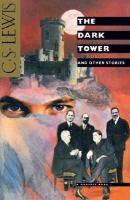
I picked up a book of C. S. Lewis’s short stories for a staff exercise in genres with Faith-Based and Inspirational Fiction. The Dark Tower and Other Stories contains some of his science fiction as well as faith-based works, so as a sci-fi fan I was eager to combine the two. Then I started reading, and my hopes swiftly plummeted. The first story is “The Man Born Blind,” a heavy-handed tale of religious allegory. Our main character has been blind all his life and has recently undergone an operation to cure it, but remains puzzled and frustrated afterwards by his inability and others’ inability to show him true “light.” The parallel between his attempts to pinpoint the source of this mysterious thing called light and man’s search for religious meaning is almost painfully obvious to the reader, but as the story is only five short pages and from a rescued rubbish stack of papers published posthumously, one can perhaps forgive its flaws.
Next I embarked on a journey into “The Shoddy Lands,” a short tale that manages to pack a lot of apparent misogyny into eight pages. I’ve not read any commentary about Lewis’ views on women, and I remember enjoying Narnia as a kid without much worry over such issues, but in this collection it is almost impossible to ignore an underlying implication in the stories that women are ignorant, shallow, and inferior. In fact--SPOILER ALERT!!!--the title of this story refers to the inner landscape of a woman’s mind, a place of poor imitation, limited interest and imagination, obsessed with only shopping, pretty baubles, and vanity. Perhaps one can argue that Lewis is bemoaning the general shallowness of his fellow man as a whole, but the emphasis on “girly” things in the shoddy lands is too strong to uphold that view, and as a result it is hard not to find insulting. There is not a lot of spirituality in the story, other than perhaps the message that modern (wo)man is too obsessed with the material and misses the true beauty of life’s immaterial gifts. The Oxford don narrator of the story seems more than a little autobiographical, though, so I was a bit entertained by the ridiculous image of C.S. Lewis nodding off and hallucinating in front of his guests.
The stories are so short I breezed through “Ministering Angels” and “Forms of Things Unknown,” which both went in a sci-fi direction. “Ministering Angels” continues the misogynistic feel with a story of a remote space station on Mars, where two women are sent as the first unit of the Woman’s Higher Aphrodisio-Therapeutic Humane Organization (abbreviated WHAT-HO) in order to keep the male pioneers healthy by engaging in what was previously termed “immorality.” Lewis gives the women no names, merely referring to them as the Fat Woman and the Thin Woman, a drunken nymphomaniac and clinical naïf respectively. Meant to show the folly of bureaucratic thinking in planning such a program, the women’s depiction instead drips with scorn for female sexuality and that horror of horrors (or whores?), the female academic. The women are portrayed as so insufferable, in fact, that--SPOILER ALERT!!!--after only a day, two of the men steal a spaceship and escape the planet rather than spend another minute in their company.
In “Forms of Things Unknown,” there are no female characters, which was really a relief after the preceding stories. I found it the most interesting story in the collection because of its pulp sci-fi feel, but it too is sadly predictable and featurs a hero that comes across as dull-witted because he remains baffled by what is clear to the reader long before. It reminds me of another science fiction short story, “Mousetrap” by Andre Norton, and although not entirely alike, “Forms” definitely suffers in comparison. Those looking for an entertaining read should look for Norton, or almost anything else. All in all, I’m sad to report that The Dark Tower was not really an enriching reading experience for me.
